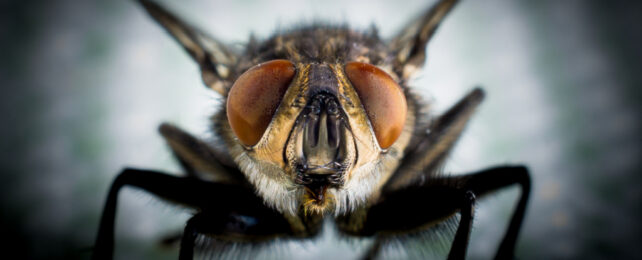Improving recall in humans with a pill or gentle jolt is still an experimental idea, but new research suggests a bacteria naturally found in up to 70 percent of insect species could in some select cases boost their learning and memory.
Researchers in China found that fruit flies infected with a particular strain of Wolbachia, a genus of bacteria first identified in 1924 in mosquitoes, performed better on tests that linked specific smells with rewards than uninfected flies.
While Wolbachia infects a variety of insect organs, the genus's tendency to be found within reproductive systems means most studies tend to focus on how the bacterium affects reproduction. Applied to prevent Aedes aegypti mosquitoes from transmitting dengue and other viruses to humans, the results of such research have been a boon to public health.
But some Wolbachia strains can infect the insect host's nervous system – including the brain.
Research has shown that male flies infected with Wolbachia are more competitive than their uninfected males, and that the bacteria affects flies' sleep.
To investigate other possible effects, biologist Meng-Yan Chen of Central China Normal University and colleagues infected fruit flies (Drosophila melanogaster) with a strain of Wolbachia called wMelPop and tested their memory compared to uninfected flies.
"As wMelPop has been demonstrated to be the strongest dengue blocking strain known, the behavioral and ecological consequences of wMelPop infection in the insect hosts may be of great importance in controlling insect-borne diseases and agricultural pests," Chen and colleagues write in their published paper.
Aside from stopping the dengue virus from replicating, the wMelPop strain also shortens the lives of the mosquitoes it infects, which struggle to feed and get 'jittery' as they age. These neurological effects are thought to be linked to how wMelPop "proliferates massively" in brain tissues, Chen and colleagues explain.
Because of the observed damage to brain tissues, the team had thought wMelPop might impair the learning and memory of insect hosts, including flies.
"To our surprise," Chen and colleagues write, "we observed that wMelPop infection still improved short-term and long-term memory of D. melanogaster."
Flies between 4 and 35 days old were exposed to two odors, one of which was paired with a sugar reward, and their recall of the smells was tested 2 minutes or 24 hours later.
Young flies infected with wMelPop performed better on both these tests than unaffected flies of the same age. wMelPop infection also boosted memory in older flies, however three-quarters of this group died before 35 days, showing once again its life-limiting effects.
Further analyses revealed distinct changes in gene expression in the flies' brain tissues: some genes were switched on while others were dialed down.
"These results suggest that wMelPop infection in Drosophila might enhance the insect host's memory by altering host gene expressions in the head," Chen and colleagues report.
The memory-enhancing effects of wMelPop in Drosophila contrast previous findings of memory loss in Wolbachia-infected wasps and pill-bugs, suggesting that Wolbachia's impact on memory depends on the host species, as well as the bacterial strain.
The researchers theorize this has to do with how the infection best spreads via each host. For example, Wolbachia deprives parasitic wasps of their memory of laying a clutch of eggs so they are more likely to lay another, enabling the bacteria to spread to more of their young. But in Drosophila a greater chance of Wolbachia spreading to more young requires female flies to be smarter so that they can find food, avoid danger, and find mates more efficiently.
The varied results might also give researchers pause considering the growing awareness of possible insect consciousness, and numerous studies demonstrating examples of insect intelligence.
The study has been published in Animal Behaviour.
